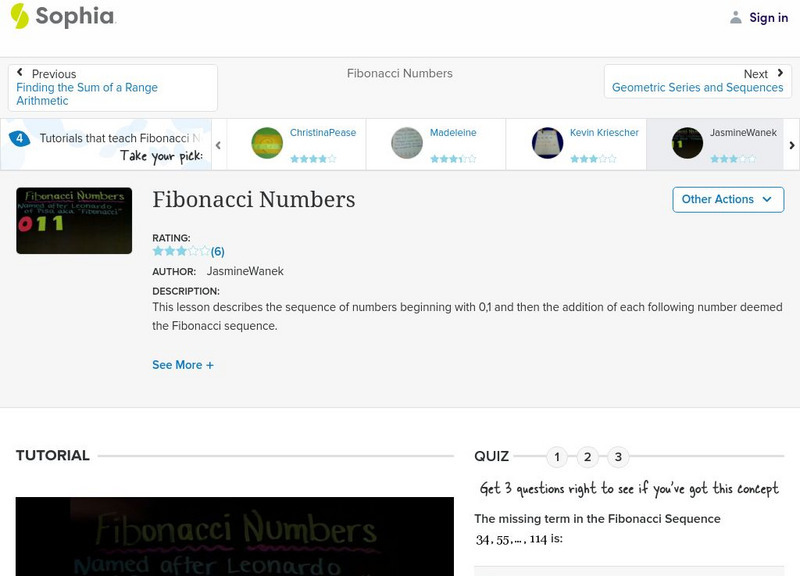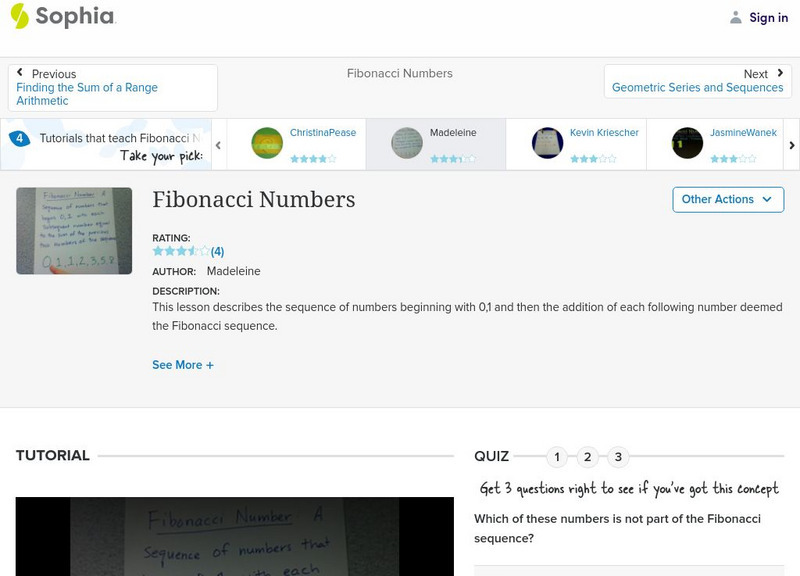Hi, what do you want to do?
Curated Video
CG2271: Mutex Review
In this video, we dive deeper into the behavior of a Mutex and understand how we can alter it using attributes. We also explore the use of the return value from the osMutexAcquire() kernel call.
Curated Video
Python 3: Project-based Python, Algorithms, Data Structures - O(nlog(n)) performance and algorithm prerequisites
Build a countdown timer using recursion This clip is from the chapter "Algorithms - Sort, performance, complexity and big O notation" of the series "Python 3: Project-based Python, Algorithms, Data Structures".This section is about...
Brian McLogan
Using the recursive formula to find the first four terms of a sequence
👉 Learn all about recursive sequences. Recursive form is a way of expressing sequences apart from the explicit form. In the recursive form of defining sequences, each term of a sequence is expressed in terms of the preceding term unlike...
Curated Video
Implement different search algorithms : BST from scratch - Search
From the section: Algorithms - Search and abstract data structures. This section is about Algorithms. You will learn about Bisection, Binary section etc. Add a search method to the BST class
Packt
Recursion: Tracing Tree – Part 2
This is the second part of the four-part recursion-based video that demonstrates how to trace a tree in data structures. This clip is from the chapter "Essential Concepts - II" of the series "Data Structures and Algorithms: The Complete...
Brian McLogan
Applying the recursive formula to a sequence to determine the first five terms
👉 Learn all about recursive sequences. Recursive form is a way of expressing sequences apart from the explicit form. In the recursive form of defining sequences, each term of a sequence is expressed in terms of the preceding term unlike...
Curated Video
Python 3: Project-based Python, Algorithms, Data Structures - Build a custom linked list
Add a search method to the BST class This clip is from the chapter "Algorithms - Search and abstract data structures" of the series "Python 3: Project-based Python, Algorithms, Data Structures".null
Brian McLogan
How to determine the first five terms for a recursive sequence
👉 Learn all about recursive sequences. Recursive form is a way of expressing sequences apart from the explicit form. In the recursive form of defining sequences, each term of a sequence is expressed in terms of the preceding term unlike...
Curated Video
Learning Python Web Penetration Testing (Video 11)
With the huge growth in the number of web applications in the recent times, there has also been an upsurge in the need to make these applications secure. Web penetration testing is the use of tools and code to attack a website or web app...
Brian McLogan
Determining the first five terms of a geometric recursive formula
👉 Learn all about recursive sequences. Recursive form is a way of expressing sequences apart from the explicit form. In the recursive form of defining sequences, each term of a sequence is expressed in terms of the preceding term unlike...
Brian McLogan
Learn how to find the first five terms of a sequence using the recursive formula
👉 Learn all about recursive sequences. Recursive form is a way of expressing sequences apart from the explicit form. In the recursive form of defining sequences, each term of a sequence is expressed in terms of the preceding term unlike...
IDG TECHtalk
How to use the chown command: 2-Minute Linux Tip
Learn how to use the chown command. It changes a file’s owner or both owner and group.
Brian McLogan
Applying the recursive formula to a geometric sequence
👉 Learn all about recursive sequences. Recursive form is a way of expressing sequences apart from the explicit form. In the recursive form of defining sequences, each term of a sequence is expressed in terms of the preceding term unlike...
Brian McLogan
How to use the recursive formula to evaluate the first five terms
👉 Learn all about recursive sequences. Recursive form is a way of expressing sequences apart from the explicit form. In the recursive form of defining sequences, each term of a sequence is expressed in terms of the preceding term unlike...
Curated Video
C++ Developer - Recursion
This video focuses on the concept of recursion. This clip is from the chapter "Functions" of the series "The Complete C++ Developer Course".This section discusses the various functions in C++.
Brian McLogan
How to find a geometric rule for a recursive sequence
👉 Learn all about recursive sequences. Recursive form is a way of expressing sequences apart from the explicit form. In the recursive form of defining sequences, each term of a sequence is expressed in terms of the preceding term unlike...
Curated Video
Understanding the Recursive Nature of the Fibonacci Sequence
In this lesson, students will learn about the Fibonacci sequence and its recursive nature. They will understand that each term in the sequence is found by adding the previous two terms together.
Getty Images
LCD TV Infinite loop. Recursion extravaganza.
LCD TV Infinite loop. Recursion extravaganza.
Other
Is All About Math: Triangular Numbers (Part Iii)
Continuing from Triangular Numbers (Part II), the podcast solves Gauss' formula for the sum of an arithmetic sequence. Recursive equations are explained heavily, and used in order to solve the Gauss formula.
Sophia Learning
Sophia: Fibonacci Numbers: Lesson 2
This lesson describes the sequence of numbers beginning with 0,1 and then the addition of each following number deemed the Fibonacci sequence. It is 2 of 12 in the series titled "Fibonacci Numbers."
Sophia Learning
Sophia: Fibonacci Numbers: Lesson 8
This lesson describes the sequence of numbers beginning with 0,1 and then the addition of each following number deemed the Fibonacci sequence. It is 8 of 12 in the series titled "Fibonacci Numbers."
Sophia Learning
Sophia: Fibonacci Numbers: Lesson 1
This lesson describes the sequence of numbers beginning with 0,1 and then the addition of each following number deemed the Fibonacci sequence. It is 1 of 12 in the series titled "Fibonacci Numbers."
Sophia Learning
Sophia: Fibonacci Numbers: Lesson 3
This lesson describes the sequence of numbers beginning with 0,1 and then the addition of each following number deemed the Fibonacci sequence. It is 3 of 12 in the series titled "Fibonacci Numbers."










